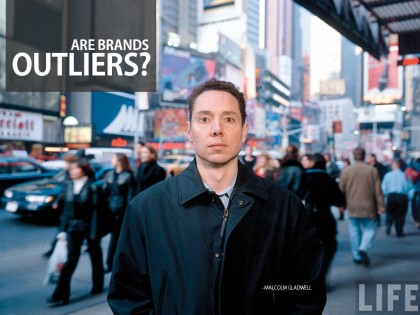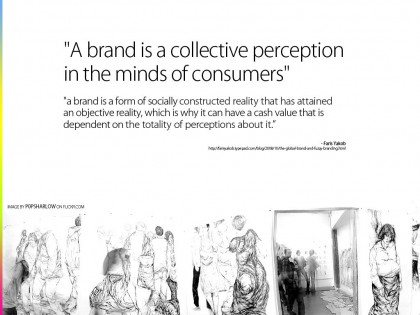I just finished Malcom Gladwells’ newest book Outliers. In the book Gladwell proposes that successful individuals owe their result to a series of fortunate incidents. They are a result of their culture, time and surroundings.
- “In this book I’m interested in people who are outliers—in men and women who, for one reason or another, are so accomplished and so extraordinary and so outside of ordinary experience that they are as puzzling to the rest of us as a cold day in August.”
– Read more
Now if individuals are the result of the people and society around them, what about brands? Are they also the result of the collective?
If one uses Gladwells theory as an anecdote to prove that anything is the product of everything, and nothing is the product of itself in isolation. Brands are the result of society – to some extent colored by marketing, but to a large extent colored by peoples’ own opinions and ideas. (which would align the thoughts of Gladwell with the thoughts og Earls)
And Faris Yakob is very right when he says that brands are a representation of the collective thought, but not only the thought, brands are the perception of the collective and will always be a product of the opportunities this collective gives them
.
Because even more interestingly, Gladwell states that one of the most important reasons for individuals success for it is their ability to recognize a unique opportunity and exploit it to it’s fullest.
Which leaves me with two suggestions:
- – First brands are a product of everything else, and need to creatively communicate their value proposition inside the fabric of culture.
– Secondly, they need to be agile enough to react, to jump at an opportunity and grab it, then work hard in order to come out at the top.
This last point rings true with John Gerzema’s theories that a brand is not a position, it’s a direction.
And it is the things that brands are worst at
the Malaysian culture, this consensus does not attempt tofor potentially additive or synergistic actions (e.g. cialis online.
. They are often a colossus, either in size or in immovability. People change brands in order for them to achieve a position. We don’t change brands in order to keep changing them.
Malcolms Gladwells book might indicate that brands need to do just that if they aim to be successful, in concert to the opportunities that present themselves.





nice mate – to steal from woody allen
brands are like sharks, if they don’t keep moving forward they die.
fx
ps glad you have comments open now ;)
Thanks for the comment Faris. I agree with the shark analogy, brilliant. :o)
[…] Malcolm Gladwell fever online at the moment. So a person is an Outlier, what about a brand? […]